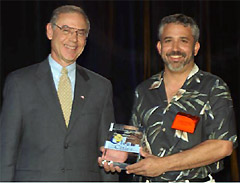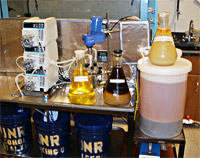Pacific Southwest, Region 9
Serving: Arizona, California, Hawaii, Nevada, Pacific Islands, Tribal Nations
 Activity in Nevada
Activity in Nevada
On this page:
Used Cooking Oil—Harvesting an Urban Crop from Casinos

The state of Nevada is well-known for its casinos. What may not be known is that casinos produce large amounts of used cooking oil. This waste cooking oil is either hauled away to landfills or clogs sewer pipes. Now, under a new collaborative effort, the casino’s waste grease is being used to make biodiesel to run Clark County School District's buses.
With over 1300 buses, Clark County has the largest biodiesel school bus fleet in the world! The district serves over 246,000 students in 266 schools. At the start of the 2002-03 school year, the district’s school bus fleet began operating entirely on B20 (a blend of 20% biodiesel and 80% petroleum based diesel).
The Clark County School District was recognized at the 2003 National Clean Cities Conference for their commitment to improving air quality and energy independence. The National Clean Cities Conference is apart of the Clean Cities Program, established by the US Department of Energy. The Clean Cities program helps transportation systems become more environmentally friendly and less dependent on imported oil.
University of Nevada Aims at Reducing NOx and Price of Biodiesel

The University of Nevada at Reno (UNR) has partnered with Region 9 and various other organizations and agencies to tackle the issue of possible increases in nitrogen oxide (NOx) emissions as well as the high price of biodiesel. To lower costs, the university’s biodiesel processing unit will be mobile, computer-operated and will run continuously to offset start-up and maintenance costs. Nitrogen will be removed before fuel production begins in an effort to reduce nitrogen oxide emissions when the fuel is burned.
Nitrogen oxides are air pollutants that contribute to smog and ground-level ozone. While all biodiesel research studies show a reduction in emissions of carbon monoxide, carbon dioxide, particulate matter, and sulfur dioxide; NOx emissions have been shown to increase in some studies and decrease in others.
This research is a part of the university’s sustainability program. To help green the campus, UNR plans to substitute all diesel fuel with biodiesel. Additionally, the mobile processing unit will allow for the transportation of biodiesel technology to rural and tribal areas in Nevada.
More information
National Biodiesel Board ![]()
Reducing Production Costs and Nitrogen Oxide Emissions from Biodiesel (PDF) (1 pp., 72K)
EPA Press release - Univ. of Nevada project
